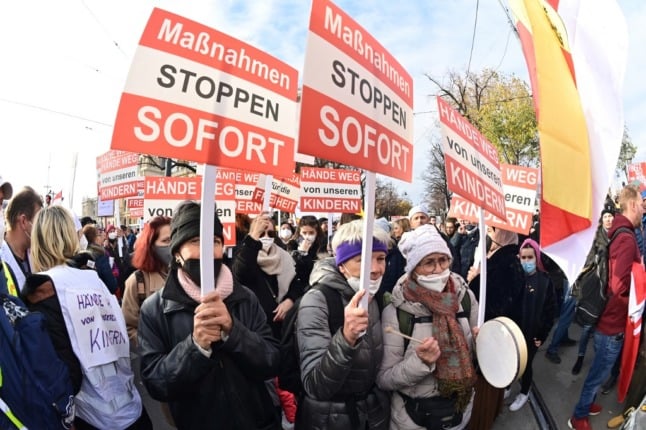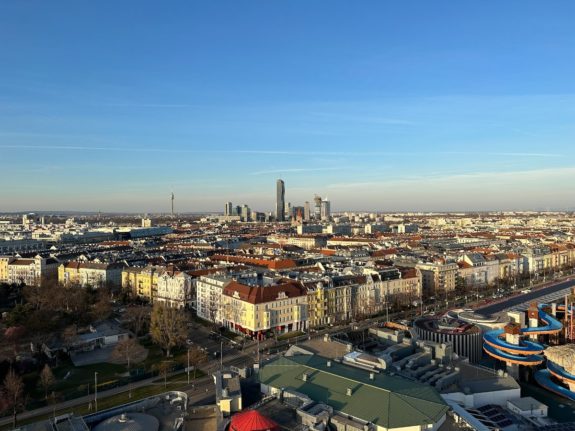Riots took place in the early afternoon in Vienna on Saturday, as protestors set off smoke bombs and threw bottles and cans at the police.
The authorities have already arrested ten people under the Prohibition Act, reported newspaper Kronen Zeitung.
In total, over 1,300 officers and some police dogs have been deployed, both from Vienna and the provinces, in response to those demonstrating against the nationwide lockdown due to come into force on Monday.
Some 40,000 people came out to protest in Austria.
Key points: How will Austria’s new national lockdown work?
The Austrian government on Friday announced that the country will go into its fourth lockdown and will make Covid-19 vaccines compulsory, as leaders again pleaded with the public to get vaccinated.
Since the announcement, thousands gathered at a rally held by Austria’s far-right Freedom Party FPÖ, waving Austrian flags and signs that argued for an end to the measures. Several demonstrators were restrained by police officers.
“It’s not normal that the government deprives us of our rights,” said 42-year-old teacher Katarina Gierscher, who travelled for six hours to attend the rally.
Some protesters wore a yellow star reading the words “not vaccinated”, in a nod to the Star of David many Jews were forced to wear during the Nazi era.
Austria’s Interior Minister Karl Nehammer expressed his outrage, saying in a statement that it “insults the millions of victims of the Nazi dictatorship and their families”.
Some have shared videos of the protest on social media, describing the new restrictions and future compulsory vaccination as a ‘Corona dictatorship’, while claiming that people want their freedom.
Demo in Wien
Das Volk will seine Freiheit! Tausende haben sich auf dem Heldenplatz versammelt, um gegen die Corona-Diktatur und die Impfpflicht zu demonstrieren. pic.twitter.com/nwwSAHzz6t— wochenblick.at (@wochenblickat) November 20, 2021
At protests with more than 50 participants, everyone must wear an FFP2 mask, unless all participants have a 2G certificate.
Under the lockdown rules, people aged over 12 without proof of 2G (full vaccination or recovery, or a first vaccine dose plus a negative PCR test) may not leave their homes except for essential reasons such as work or buying food.
Many of the demonstrators were reportedly not wearing a mask, but officials have been making identity checks throughout the afternoon.
READ ALSO: ‘Unavoidable’: How Austria has reacted to the new nationwide lockdown
Citizens were warned of temporary traffic disruption and road closures, while people were advised there could be restrictions to the public transport system.
Meanwhile, other cities in Austria also held demonstrations. In Innsbruck, thousands gathered.
Nicht nur in #Wien ziehen heute Corona-LeugnerInnen auf – auch in fast allen größeren Städten gibt es Demos für diejenigen die nicht nach Wien gefahren sind.
So bspw. in der Tiroler Landeshauptstadt #Innsbruck wo mehrere Tausend Personen unterwegs sind #w2011 pic.twitter.com/pWhGe5Xliy— Moritz Siman (@M000X) November 20, 2021
Austria’s nationwide general lockdown will start on Monday and will be reviewed after the first ten days. It will last for “a maximum” of 20 days for vaccinated people. This means it will end on December 13th if no further changes are made.
However, the lockdown for unvaccinated people is set to continue after the end of the general lockdown if judged necessary.
Schools will remain open during the lockdown, although children are advised to stay home wherever possible.
Covid-19 in Austria: Follow the latest developments as they happen
Shops and restaurants will be forced to close, while working from home will be mandatory in any job where it is possible to do so.
Other new rules include the mandatory wearing of FFP2 masks in all enclosed rooms. Anyone found breaking the rules will face fines.
Everyone in Austria will need to be vaccinated from February 1st onwards, the government has also announced.
The new measures were announced after Austria recorded another all-time high for new daily cases on Thursday, with 15,145 cases reported in 24 hours.



 Please whitelist us to continue reading.
Please whitelist us to continue reading.
Member comments